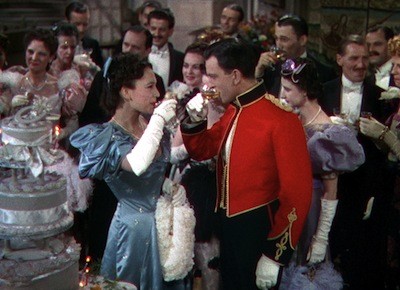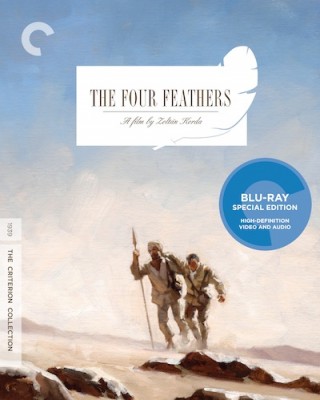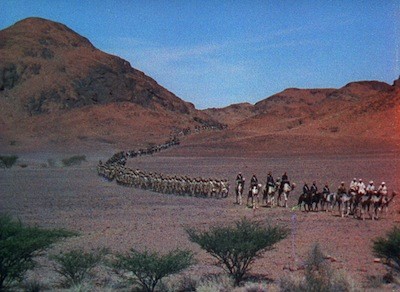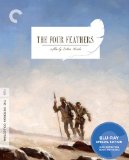| Reviews & Columns |
|
Reviews DVD TV on DVD Blu-ray 4K UHD International DVDs In Theaters Reviews by Studio Video Games Features Collector Series DVDs Easter Egg Database Interviews DVD Talk Radio Feature Articles Columns Anime Talk DVD Savant Horror DVDs The M.O.D. Squad Art House HD Talk Silent DVD
|
DVD Talk Forum |
|
|
| Resources |
|
DVD Price Search Customer Service #'s RCE Info Links |
|
Columns
|
|
|
Four Feathers: The Criterion Collection, The
THE MOVIE:
Please Note: The images used here are promotional stills and are not taken from the Blu-ray edition under review.

Zoltán Korda's 1939 epic The Four Feathers is an entertaining anachronism. It's a war picture that celebrates colonialism, that decries cowardice and glorifies reckless valor. It uses outdated terminology to describe the opposition, yet except for a couple of very small scenes, manages to avoid draping the face of caricature over the Arab masses. The Brits are racist, but strangely, for the most part, the film is not.
It's also a lot of fun, and despite a slow start, genuinely rousing as the combat heats up. It starts in the 1880s when Islamic rebels reclaim the Sudan and take Khartoum from the English, killing one of their generals. This is seen as a terrible disgrace amongst the old guard who fought to grab the region originally. General Faversham (Allan Jeayes), General Burroughs (June Duprez), and Dr. Sutton (Frederick Culley) all have white hair now, but at one time, they made blood run red. General Faversham in particular has concern for his young son Harry (Clive Baxter initially), who prefers reading the poems of Shelley to hearing his doddering father's anecdotes about war.
Power cut ten years ahead, and the British are finally ready to take back their foothold in Egypt. General Haversham is dead, and Harry is grown up and an army officer. Played now by John Clements (At Dawn We Die), he is in the same regiment as Burroughs' son Peter (Donald Gray) and also engaged to his daughter Ethne (June Duprez). Ethne has chosen him over his comrade John (Ralph Richardson, The Fallen Idol), seeing something more appealing in the dark, brooding gentleman than the stiff-upper-lip type that John represents.
It's a pretty tangled social clique, but important groundwork for the adventure to follow. As the boys are about to ship out, Harry decides he'd rather not go and resigns his post. John, Peter, and their other friend Willoughby (Jack Allen) all feel betrayed, and they send Harry a package with a single white feather from each of them. It's an old custom, basically throwing down a gauntlet and calling Harry a coward. The fourth feather comes from Ethne, who doubts Harry's true motivations for bailing on his duty. Harry doubts these things himself, and to earn the right to return the feathers to their original owners and free himself from their stigma, he travels to Egypt. Since he's no longer in the army, he infiltrates a group of ethnic outcasts and poses as an Arab, slipping unnoticed into the battlefield. Once in the desert, he finds his old pals and saves them from trouble, at first anonymously but eventually revealing his identity as the situations grow more hairy.
The Four Feathers was based on a book by A.E.W. Mason. Though popular enough to spawn multiple film versions--the Korda boys made the fourth--I had never heard of it prior to a remake with Kate Hudson and Heath Ledger a few years back (which I never saw). While Zoltán's adaptation, which was written by R.C. Sherriff (That Hamilton Woman), makes me curious to see how other filmmakers might have handled it, were I to never see any of the other versions, I'd be totally happy. I found this Four Feathers to be an engrossing piece of cinema, full of drama, interesting characters, and exciting battles. Zoltán Korda stages large combat scenes on open desert plains, using the elements as an additional weapon, almost as if the land itself were trying to get rid of all human invaders. The situation with John and Harry is particularly memorable, with the bright desert sun doing more damage to John than his enemy ever gets a chance to. Richardson delivers a solid performance, balancing on a fine line when a touch of humor is called for, but careful not to overdo it and undercut the pathos that is essential to his character's fate.
Despite the backdrop of war, The Four Feathers is ultimately about loyalty more than it is the far more simplistic cowardice/courage dichotomy. Perhaps that's why it's aged so well, actually. The sense of duty Harry feels is less to his country than it is to his countrymen, and more specifically his friends and the woman he loves. Had the patriotism had more of a rah-rah feel, the colonial aspects would probably be a lot harder to take. What makes Harry so compelling is his desire to prove himself to the people he cares about, and instead of doing it in the way that might be expected (i.e. rejoining the army as a foot soldier or begging his dad's cronies to give him back his ranking), he finds his own way to be a part of the action. It's the more romantic solution, so maybe reading all that Shelley paid off after all!
Or perhaps the fact that The Four Feathers was a family affair had some influence on how it all came together. Alexander Korda produced the picture, and Vincent Korda did the marvelous set design, creating a pronounced contrast between the colorful British homes and the harsher conditions of the desert battlefields. Apparently there was some tension between Zoltán and Alexander, and the lingering shots of the insurgency prepping for their raid was representative of the director's more sympathetic viewpoint. Had he not won out, The Four Feathers would have been the kind of jingoist propaganda I feared it might be. A more straightforward war film would have been a lot less interesting. Even on a scale as grand as this one, nuance proves to be everything.

THE BLU-RAYc
Video:
The 1080p, MPEG-4 AVC transfer brings The Four Feathers to us at its original 1.37:1 aspect ratio. The look of the picture is quite amazing, presenting this early Technicolor film with accurate rendering of the textural colors of the period, flaws and all. Occasional inconsistencies or colors bleeding are to be expected, and Criterion avoids enhancing the natural look of the film in any way that would reduce its original pigments and grains. No scratches, dirt, or debris appear, and though I saw two instances where missing frames caused a quick jump in action, I don't doubt these are just unfixable holes in the source. Criterion's The Four Feathers is an excellent example of how to handle classic films on Blu-Ray.
Sound:
The monaural, uncompressed soundtrack has clear tones and a fine volume balance. There is some static in a couple of quiet scenes, but nothing that is too overbearing. The music has good punch without distortion, and the dialogue is all easy to hear. Subtitles for the deaf and hearing impaired are also available.
Extras:
Criterion releases The Four Feathers in a standard plastic case. It has an insert with a lengthy, informative essay by Michael Sragow. Between this and the audio commentary by historian Charles Drazin, you're going to be totally up on your Four Feather history. Drazin also talks about the Kordas and some of the challenges of a production of this kind in 1939.
The other extras are both vintage and new. The 24-minute interview with David Korda, son of director Zoltán Korda, was recorded recently and covers the older man's film career and the impact of this particular film. Older here is the 1939 short A Day at Denham (11 mins.), which shows Zoltán Korda shooting The Four Feathers. There is also a theatrical trailer included.
The extras are presented in high-definition, 1080p.
FINAL THOUGHTS:
Though the product of a different age, Zoltán Korda's adaptation of A.E.W. Mason's desert warfare novel The Four Feathers still manages to thrill and delight in equal measure. It's a tale of great camaraderie and romance, with big battles and surprisingly complex emotional responses. The restoration on this 1939 film looks lovely on Blu-Ray, and the extras are informative. Highly Recommended.

Jamie S. Rich is a novelist and comic book writer. He is best known for his collaborations with Joelle Jones, including the hardboiled crime comic book You Have Killed Me, the challenging romance 12 Reasons Why I Love Her, and the 2007 prose novel Have You Seen the Horizon Lately?, for which Jones did the cover. All three were published by Oni Press. His most recent projects include the futuristic romance A Boy and a Girl with Natalie Nourigat; Archer Coe and the Thousand Natural Shocks, a loopy crime tale drawn by Dan Christensen; and the horror miniseries Madame Frankenstein, a collaboration with Megan Levens. Follow Rich's blog at Confessions123.com.
|
| Popular Reviews |
| Sponsored Links |
|
|
| Sponsored Links |
|
|
| Release List | Reviews | Shop | Newsletter | Forum | DVD Giveaways | Blu-Ray | Advertise |
|
Copyright 2024 DVDTalk.com All Rights Reserved. Legal Info, Privacy Policy, Terms of Use,
Manage Preferences,
Your Privacy Choices | |||||||












